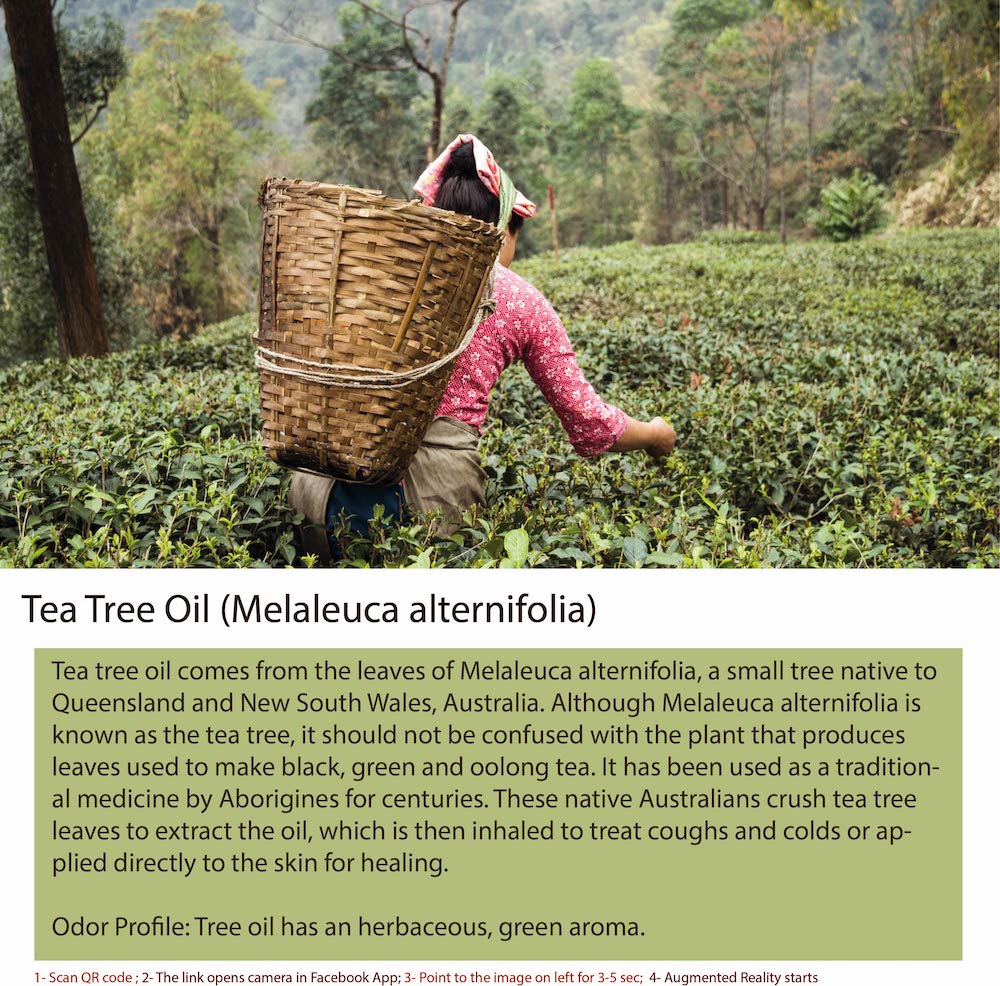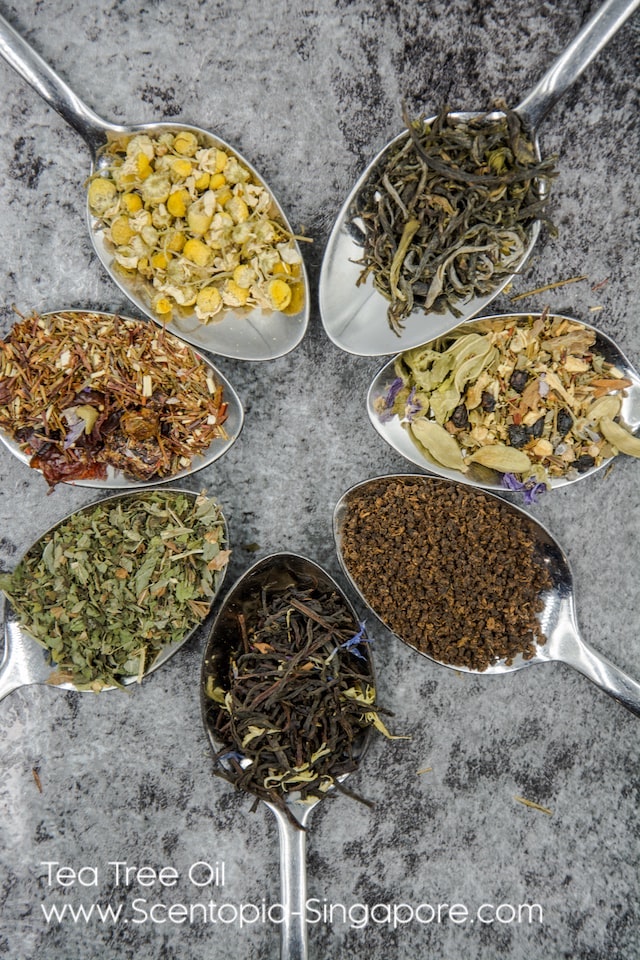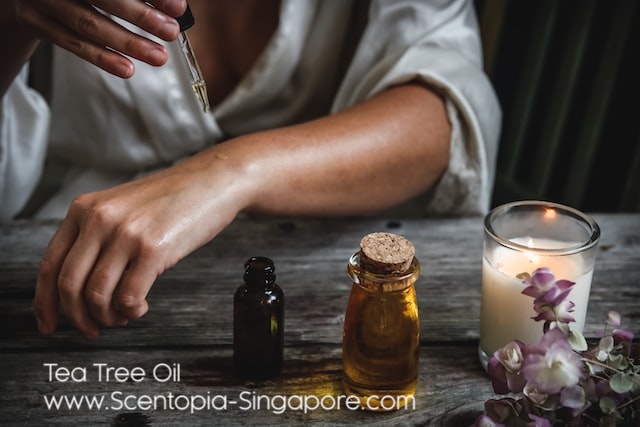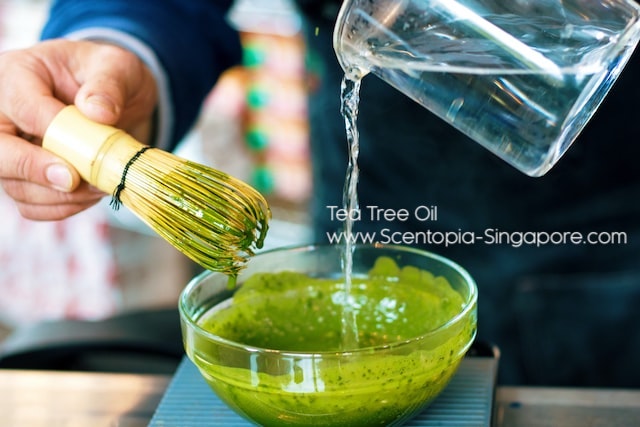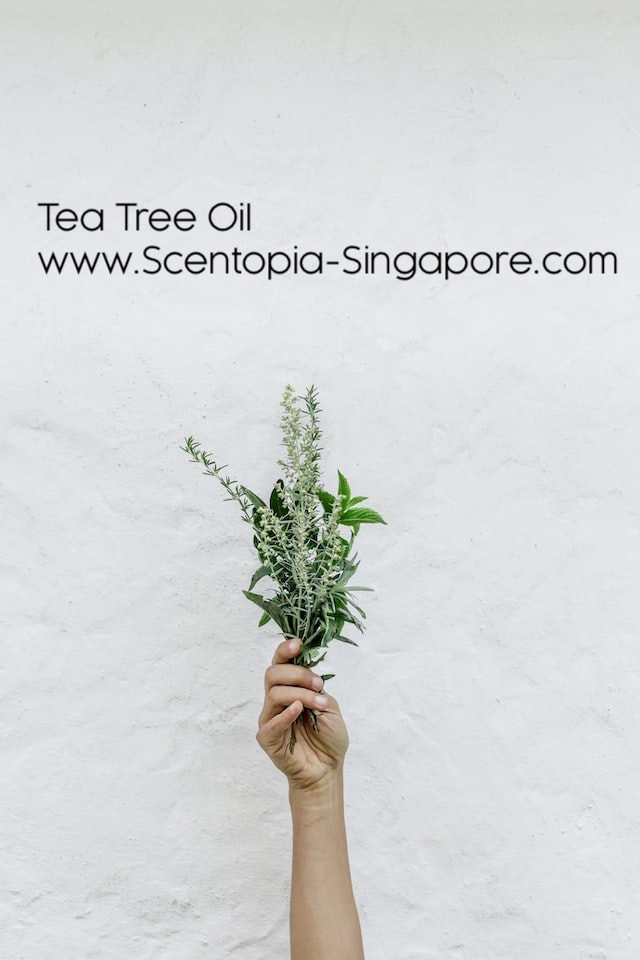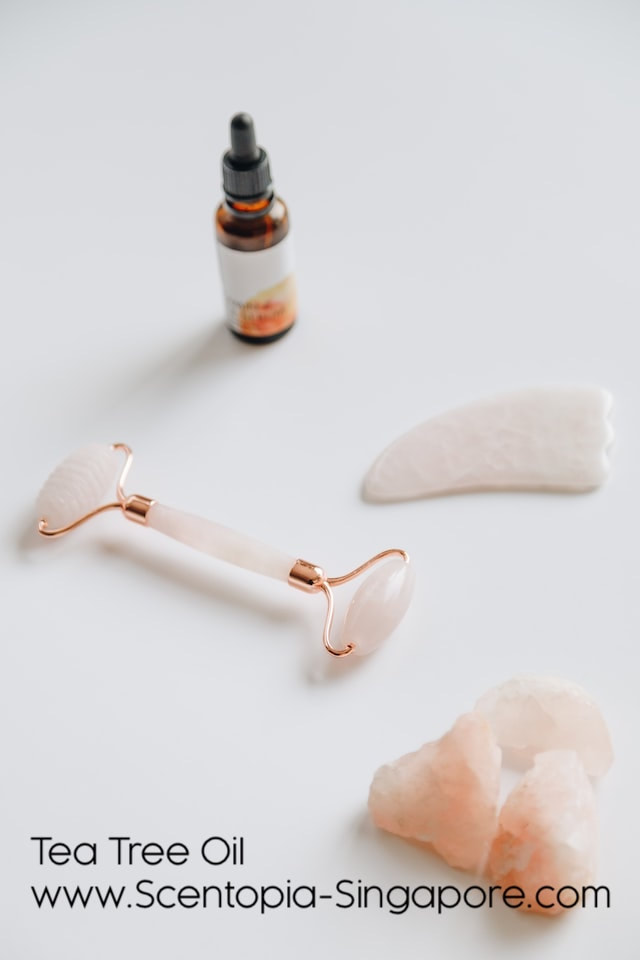Elevate Your Senses with Natural Fragrances
Tea Tree Oil: The Versatile Extract of Nature's Healing and Aromatic Delights
Introduction: Tea Tree Oil, with its potent therapeutic properties and aromatic allure, is a highly valued essential oil celebrated for its presence in perfumes, therapeutic oils, and medicinal applications. Scientifically known as Melaleuca alternifolia, Tea Tree Oil is derived from the leaves of the tea tree, native to Australia. This oil has been cherished by indigenous communities for centuries due to its healing properties, and its popularity has spread worldwide for its diverse applications. From inspiring perfumers with its refreshing fragrance to offering potential health benefits in therapeutic oils and traditional medicine, Tea Tree Oil is more than just an extract. This essay delves into the captivating world of Tea Tree Oil, encompassing its presence in perfumes, therapeutic oils, medicinal systems, historical significance, and intriguing fun facts about this extraordinary and cherished oil.
The Aromatic Allure of Tea Tree Oil: Tea Tree Oil is renowned for its refreshing and herbaceous fragrance, which is often described as medicinal and earthy. This distinctive aroma adds depth to perfumes and enhances the therapeutic properties of the oil.
Perfumes and Fragrance: Tea Tree Oil's invigorating fragrance has inspired perfumers to create scents that capture the essence of this delightful oil. While it is not a primary fragrance note in perfumery, its inclusion in some blends offers a unique and refreshing twist.
Therapeutic Oils and Aromatherapy: Tea Tree Oil is a popular essential oil used in aromatherapy for its potential benefits. Its aroma is believed to promote a sense of clarity, focus, and relaxation. Additionally, it is valued for its potential antibacterial and antifungal properties.
Medicinal Applications: Tea Tree Oil has a long history of use in traditional medicine systems, particularly by the indigenous people of Australia. It is believed to have potential benefits for treating skin conditions, wounds, and respiratory issues.
Historical Significance: The indigenous people of Australia, particularly the Bundjalung tribe, have used Tea Tree Oil for generations as a natural remedy for various ailments. They would crush the leaves of the tea tree and apply the oil to wounds and skin irritations.
Fun and Crazy Facts:
Tea Tree Oil, with its aromatic allure and potential wellness benefits, is a cherished and versatile extract that continues to captivate and inspire with its refreshing fragrance and healing properties. From its presence in perfumes to its potential uses in aromatherapy and traditional medicine, Tea Tree Oil offers a wealth of enjoyment and potential health benefits. As we savor the invigorating aroma and explore its cultural significance and historical uses, we are reminded of the enduring appeal and natural charm of this extraordinary oil that has enriched our perfumery, healing practices, and skin care routines with its unique fragrance and therapeutic potential.
Introduction: Tea Tree Oil, with its potent therapeutic properties and aromatic allure, is a highly valued essential oil celebrated for its presence in perfumes, therapeutic oils, and medicinal applications. Scientifically known as Melaleuca alternifolia, Tea Tree Oil is derived from the leaves of the tea tree, native to Australia. This oil has been cherished by indigenous communities for centuries due to its healing properties, and its popularity has spread worldwide for its diverse applications. From inspiring perfumers with its refreshing fragrance to offering potential health benefits in therapeutic oils and traditional medicine, Tea Tree Oil is more than just an extract. This essay delves into the captivating world of Tea Tree Oil, encompassing its presence in perfumes, therapeutic oils, medicinal systems, historical significance, and intriguing fun facts about this extraordinary and cherished oil.
The Aromatic Allure of Tea Tree Oil: Tea Tree Oil is renowned for its refreshing and herbaceous fragrance, which is often described as medicinal and earthy. This distinctive aroma adds depth to perfumes and enhances the therapeutic properties of the oil.
Perfumes and Fragrance: Tea Tree Oil's invigorating fragrance has inspired perfumers to create scents that capture the essence of this delightful oil. While it is not a primary fragrance note in perfumery, its inclusion in some blends offers a unique and refreshing twist.
Therapeutic Oils and Aromatherapy: Tea Tree Oil is a popular essential oil used in aromatherapy for its potential benefits. Its aroma is believed to promote a sense of clarity, focus, and relaxation. Additionally, it is valued for its potential antibacterial and antifungal properties.
Medicinal Applications: Tea Tree Oil has a long history of use in traditional medicine systems, particularly by the indigenous people of Australia. It is believed to have potential benefits for treating skin conditions, wounds, and respiratory issues.
Historical Significance: The indigenous people of Australia, particularly the Bundjalung tribe, have used Tea Tree Oil for generations as a natural remedy for various ailments. They would crush the leaves of the tea tree and apply the oil to wounds and skin irritations.
Fun and Crazy Facts:
- World War II Use: During World War II, Tea Tree Oil was included in the first aid kits of Australian soldiers for its potential antiseptic properties.
- Scientific Naming: The scientific name "Melaleuca alternifolia" refers to the alternate arrangement of leaves on the tea tree plant.
- Insect Repellent: Tea Tree Oil is known to repel insects, making it a natural and safer alternative to chemical insect repellents.
- Acne Treatment: Tea Tree Oil is a popular ingredient in skincare products, especially for treating acne, due to its potential antibacterial and anti-inflammatory properties.
- Tea Tree Harvesting: Harvesting Tea Tree Oil is labor-intensive, as the leaves are hand-picked and then steam-distilled to extract the oil.
Tea Tree Oil, with its aromatic allure and potential wellness benefits, is a cherished and versatile extract that continues to captivate and inspire with its refreshing fragrance and healing properties. From its presence in perfumes to its potential uses in aromatherapy and traditional medicine, Tea Tree Oil offers a wealth of enjoyment and potential health benefits. As we savor the invigorating aroma and explore its cultural significance and historical uses, we are reminded of the enduring appeal and natural charm of this extraordinary oil that has enriched our perfumery, healing practices, and skin care routines with its unique fragrance and therapeutic potential.
To experience augmented reality, please open the Facebook-app using QR code and point to the image below
The Power of Tea Tree Oil in Aromatherapy
Tea tree oil is an essential oil derived from the leaves of the tea tree (Melaleuca alternifolia). It has antimicrobial and anti-inflammatory properties, and is commonly used in skincare and personal care products for treating acne, fungal infections, and dandruff. It can also be used as a natural remedy for minor cuts and scrapes, insect bites, and other skin irritations. However, tea tree oil should be diluted before use as it can cause skin irritation and is toxic if ingested.
Tea tree is a plant species (Melaleuca alternifolia) native to Australia. It is known for its essential oil, which is used for various purposes, including skincare, personal care, and natural remedy for minor health conditions. The oil has antimicrobial and anti-inflammatory properties, and is commonly used to treat acne, fungal infections, dandruff, and other skin irritations. Tea tree oil should be diluted before use, as undiluted oil can cause skin irritation and is toxic if ingested.
Tea tree is a plant species (Melaleuca alternifolia) native to Australia. It is known for its essential oil, which is used for various purposes, including skincare, personal care, and natural remedy for minor health conditions. The oil has antimicrobial and anti-inflammatory properties, and is commonly used to treat acne, fungal infections, dandruff, and other skin irritations. Tea tree oil should be diluted before use, as undiluted oil can cause skin irritation and is toxic if ingested.
Exploring Our Unique Fragrance Collection
Tea tree is a cultural symbol for the Indigenous people of Australia, particularly for the Bundjalung people. For them, the plant holds spiritual significance and is used in traditional healing practices. In terms of art appreciation, tea tree has inspired various works of art, including paintings, sculptures, and textiles, showcasing its beauty and cultural importance. In contemporary times, tea tree oil has become a popular ingredient in skincare and personal care products, which has led to a growing appreciation of the plant in popular culture.
Here are some fun facts about tea tree:
Here are some fun facts about tea tree:
- The plant is native to Australia and has been used for centuries by Indigenous people for its medicinal properties.
- Tea tree oil is made from the leaves of the tea tree and has a strong, distinctive aroma.
- The oil is known for its antimicrobial and anti-inflammatory properties, making it a popular ingredient in skincare and personal care products.
- The tea tree was given its name by British explorer Captain James Cook, who used the leaves to make a tea-like beverage.
- The plant can grow up to 7 meters tall and has small white or cream-colored flowers.
- In addition to skincare and personal care products, tea tree oil is also used in cleaning products and air fresheners due to its fresh, invigorating scent.
- Tea tree is also used in aromatherapy for its ability to soothe and calm the mind.
Organic Perfumery Crafted in Singapore
Tea tree oil is known for its medicinal properties and has been used for various purposes, including:
- Skin care: Tea tree oil is commonly used to treat acne, fungal infections, and dandruff due to its antimicrobial and anti-inflammatory properties.
- Natural remedy: The oil can be used as a natural remedy for minor cuts, scrapes, insect bites, and other skin irritations.
- Oral health: Tea tree oil is sometimes used as a mouthwash or added to toothpaste for its ability to fight gum disease and freshen breath.
- Respiratory issues: Inhaling tea tree oil or using it in a diffuser is believed to help with respiratory issues such as sinusitis and bronchitis.
- Aromatherapy: Tea tree oil is used in aromatherapy for its fresh, invigorating scent and its ability to soothe and calm the mind.
Discover the Essence of Herbal Aromatherapy
Tea tree oil is widely used in aromatherapy for its fresh, invigorating scent and its ability to soothe and calm the mind. Some ways tea tree oil is used in aromatherapy include:
- Diffuser: Adding a few drops of tea tree oil to a diffuser can help purify the air and create a calming atmosphere.
- Inhalation: Inhaling the scent of tea tree oil directly from the bottle or using it in a steam inhalation can help with respiratory issues and promote a sense of relaxation.
- Massage: Adding a few drops of tea tree oil to a carrier oil, such as almond or coconut oil, and using it for massage can help soothe sore muscles and promote a sense of calm.
- Bath: Adding a few drops of tea tree oil to a bath can help soothe skin and promote relaxation.
- Personal care: Adding a few drops of tea tree oil to personal care products, such as shampoo or body wash, can help improve the overall experience and promote a sense of well-being.
Unwind with the Soothing Aroma of Nature
Tea tree oil is commonly used in cosmetics and personal care products due to its antimicrobial and anti-inflammatory properties. Some ways tea tree oil is used in cosmetics and personal care include:
- Skincare: Tea tree oil is commonly used in skincare products, such as face wash, toner, and spot treatments, for its ability to treat acne and other skin irritations.
- Hair care: Tea tree oil is sometimes used in hair care products, such as shampoo and conditioner, for its ability to treat dandruff and other scalp conditions.
- Oral care: Tea tree oil is sometimes added to toothpaste and mouthwash for its ability to fight gum disease and freshen breath.
- Nail care: Tea tree oil is sometimes used in nail care products, such as cuticle oil, for its antifungal properties and ability to improve the overall health of the nails.
- Body care: Tea tree oil is sometimes added to body care products, such as body wash and lotion, for its ability to soothe and improve the overall health of the skin.
The scent of tea tree oil is often described as fresh, medicinal, and slightly earthy. It has a strong, distinctive aroma that is both invigorating and calming. Some people describe the scent as similar to eucalyptus or mint, but with a more medicinal and slightly sharp edge. The scent of tea tree oil is easily recognizable and can be a popular choice for use in skincare, personal care, and cleaning products due to its fresh and purifying scent.
The main chemical components of the scent of tea tree oil are terpinen-4-ol and 1,8-cineole. These two compounds contribute to the fresh, medicinal, and slightly earthy aroma of tea tree oil. Terpinen-4-ol is responsible for the antiseptic and antifungal properties of tea tree oil, while 1,8-cineole contributes to its fresh, invigorating scent. - Other compounds found in tea tree oil, such as alpha-terpinene and alpha-pinene, also contribute to its overall scent profile and may have additional therapeutic benefits, including antibacterial, anti-inflammatory, and expectorant properties.
Tea Tree Oil Perfume: A Botanical Delight
Tea tree oil is used as a fragrance ingredient in perfumes and personal care products due to its fresh, invigorating scent. In perfumes, tea tree oil is often used to add a medicinal and slightly earthy note to the overall fragrance. The scent of tea tree oil can complement other fresh and herbal scents, such as eucalyptus, lavender, and rosemary, to create a clean and refreshing fragrance.
It's important to note that tea tree oil is a potent and concentrated fragrance ingredient and should be used in small amounts in perfumes to avoid overpowering the scent. The scent of tea tree oil may also vary depending on the source of the oil and the extraction method used. Additionally, some people may be sensitive to the scent of tea tree oil and experience skin irritation or allergic reactions when using perfumes that contain it.
Tea is a popular fragrance note in perfumes, as it evokes feelings of comfort, relaxation, and elegance. Perfumes with a tea fragrance note often feature scents inspired by black tea, green tea, jasmine tea, or chai tea.
Some popular tea-inspired perfumes include:
It's important to note that tea tree oil is a potent and concentrated fragrance ingredient and should be used in small amounts in perfumes to avoid overpowering the scent. The scent of tea tree oil may also vary depending on the source of the oil and the extraction method used. Additionally, some people may be sensitive to the scent of tea tree oil and experience skin irritation or allergic reactions when using perfumes that contain it.
Tea is a popular fragrance note in perfumes, as it evokes feelings of comfort, relaxation, and elegance. Perfumes with a tea fragrance note often feature scents inspired by black tea, green tea, jasmine tea, or chai tea.
Some popular tea-inspired perfumes include:
- Elizabeth Arden Green Tea - A fresh and invigorating fragrance inspired by the scent of green tea.
- Jo Malone Earl Grey & Cucumber - A sophisticated and elegant fragrance inspired by the scent of earl grey tea and cucumber.
- Thierry Mugler Alien - A warm and comforting fragrance inspired by the scent of jasmine tea.
- Demeter Chai Tea - A spicy and warming fragrance inspired by the scent of chai tea.
- L'Occitane En Provence Rose Tea - A delicate and floral fragrance inspired by the scent of rose tea.
Join Scentopia, Sentosa's latest tourist attraction wonderful orchid scent crafting, fragrance tour, bridal shower or corporate team building which includes perfume making onsite and offsite, beach activities and more. We also serve primary school learning journey, secondary students and pupil on industrial excursions. Know more about our orchids perfume bar or therapeutic orchid scents and other wellness aromas. Conatct Perfume workshop or book a scent crafting session here.

